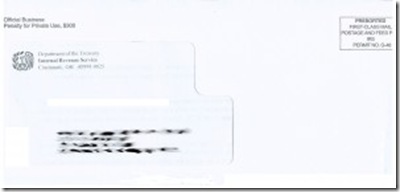
It’s a simple enough little envelope, much the same as a lot of other mail you might receive… but look at the return address. IT’S. FROM. THE. IRS.
ohmygoshohmygoshohmygoshohmygoshohmygosh!!!!!!!!!!!!!!!!!!!!
What should you do? (Other than sit down, of course, before you fall down)
Steps To Take
First and foremost: calm down. The IRS sends out literally millions of these notices, often for clarification of a minor item that was either entered incorrectly, or inadvertently omitted from your return. The point is, it’s not the end of the world. But there are some very important steps you need to take when you receive such a notice.
Read. It may sound like a ridiculous thing to say, but you’ve got to read what they’re telling you. You’d be surprised how many folks are terrified to even open the letter! Quite often all they’re asking for is clarification on your return, something didn’t match up in their records. It could be quite simple! Or it could be something more complicated, but you need to read and understand what the notice is about so you know what to do next.
Take action – don’t ignore it. The IRS has these wonderful computer systems in place that keep track of your situation, even when you’re not. Ignoring the situation will not make it go away – if they’re asking for more information, provide what they ask for. Start with the letter, and get figured out what you need to do to straighten things up.
Call the number. On your notice there should be a number to call if you don’t understand the notice, or if you have questions. Bear in mind that this first line of defense at the Service is mostly interested in collecting money – and if that’s what your notice is about, you need to be prepared to hold your ground if you disagree with the notice. Also, know that calling the number is not a five-minute affair. Especially in these days of reduced staffing, you should expect the phone call to take at least an hour if not more time to just get someone to talk to. You need to do this when you have plenty of time on your hands.
Keep records. Every notice you receive, every time you call, every time you write, keep a record of the interaction. When you talk to the IRS office, every person you speak with will give you his or her name and badge number. Write it down – along with everything you say, and everything the IRS agent says. This can be critical if something changes along the line, and you need to justify why you did one thing or another. You don’t need a complete word-by-word transcript, but make sure you have the important parts of the interaction documented – especially deadlines!
Don’t get in over your head. If you’re overwhelmed by the notice, the communication, and the whole process, get help. You can find experienced tax professionals in your area by looking on the National Association of Enrolled Agents (NAEA) website (or you can call me). These folks are ready and willing to help you through the maze of working with the IRS – even if you’ve already started the communications process and found out you’ve bitten off more than you can chew.
Don’t just give in. If the notice indicates that you owe the IRS some amount of money, don’t just pay it to get it over with. The IRS is often wrong – especially when it comes to missing tax forms or miscalculations. It may seem like the safest thing to do: give them whatever they’re asking for and get them off your back! But it can really work against you if you don’t know what you’re doing.
For example, if you had cashed in a bond and forgot to include that information on your return, the IRS is going to assume that you had a zero basis in the bond. If you purchased the bond for $10,000 and later sold it for $10,100, the IRS only knows about the $10,100 that you received when you sold the bond, and in their notice they’ll indicate that you owe tax on $10,100. But in the end, when you file your amended return with your basis properly reported on Schedule D, you end up only owing tax on the $100 gain. Big difference! And if you just gave in, you’d have given them far more than you really owed.
Work it out. If it turns out that you do owe additional money to the IRS and you just can’t swing paying it all at once, ask for a payment plan. It’s not cheap to do this, but it’s a whole lot better than just ignoring the IRS altogether. Because pretty soon after you do that, you start to notice how your entire wardrobe is made up of black and white striped clothes. (Hint: that’s what you get to wear in prison!)
Summing it all up
Okay – you’ve got the notice. It’s not the end of the world. By all means, take action, do something about it, and get help if you need it. (by the way, you can also call me directly if you need help with one of these.) Good luck!